Isoflavones are plant compounds that mimic estrogen and offer various health benefits. These compounds, primarily found in soybeans, have anti-inflammatory and antioxidant properties that can help protect cells from damage. Studies suggest that isoflavone supplements may help alleviate menopausal symptoms and prevent conditions like osteoporosis.
Known as phytoestrogens, isoflavones bind to estrogen receptors in the body and can have estrogenic or antiestrogenic effects depending on hormone levels. Research on isoflavone consumption for menopausal symptoms shows promising results, such as reducing hot flashes and improving irritability. However, more standardized research is needed to confirm these health effects.
In Asian countries where soy is a dietary staple, lower rates of heart disease, breast cancer, and prostate cancer are observed. Studies suggest that isoflavones may reduce the risk of breast cancer, improve cholesterol levels, and have a positive impact on blood pressure. However, more research is needed to fully understand the effects of isoflavones on various health conditions.
While isoflavones show potential benefits for conditions like diabetes, high cholesterol, and irritable bowel syndrome, there are also potential risks associated with long-term supplement use. Side effects may include gastrointestinal upset and allergic reactions. It’s important to consult with a healthcare provider before starting isoflavone supplements, especially if you have specific health conditions or are taking medications.
Rich food sources of isoflavones include soybeans, tofu, miso, and lentils. Red clover and alfalfa are also good sources of these plant compounds. Supplements are available for those who may not consume enough isoflavone-rich foods, but it’s essential to choose products that align with clinical research recommendations and are quality-tested for safety and effectiveness.
Overall, while isoflavones offer potential health benefits, it’s crucial to approach their use with caution and under the guidance of a healthcare provider. More research is needed to fully understand the effects of isoflavones on various health conditions and to determine the optimal dosages for different populations.
📰 Related Articles
- Makhana’s Health Benefits and Risks Unveiled by Nutritionist
- Exploring Coffee: Benefits, Risks, and Modern Trends
- Chia Seeds: Health Benefits and Risks Unveiled
- Understanding False Miscarriages: Causes, Diagnosis, and Risks Unveiled
- Understanding Abdominal Tap: Procedure, Risks, and Benefits
📚Book Titles
- Empowering Elegance: Mastering the Art and Business of the Lash Industry
- Rewiring Existence: The Radical Journey of Body Hacking and Transhumanism
- Legacy of Value: A Global Exploration of Ancient Currency and Modern Wealth
- Blueprint to Comprehensive Wellness: Strategize Your Nutrition, Fitness, and Mental Health






